 |
 |
Can't view this email? Visit the newsletter in your browser.
|
| "A world where equity is at the root of a dynamic harmony between peoples and nature, as well as among peoples..." |

 |
|
Comments from the Chair: Aroha Te Pareake Mead
Expectations of indigenous peoples and civil society were never high for the Durban negotiations based on the difficulties of securing any level of meaningful commitment from governments to reduce emissions and development standards in past negotiations. But many hoped that leaders would surprise us all by prioritising nature. Sadly this was not to be. Kumi Naidoo, Greenpeace International's director said 'I hope sanity will prevail with climate change, just as it did with apartheid'. Something certainly needs to happen to make leaders, particularly of the developed world, take environmental wellbeing and sustainability more seriously. We only have one home on planet earth, there is no Plan B. The Guest Editorial and a number of articles in this provide impressions and highlight contributions of CEESP members in Durban following the Climate Change negotiations. |
 |
 |
|
Durban's COP 17: perils of inaction by Francisco Aguayo (TEMTI member) GUEST EDITORIAL The 17th Conference of the Parties (COP 17) is taking place in the city of Durban, South Africa, from 28 November to 9 December 2011. This new round of climate negotiations under the UN Framework Convention on Climate Change will face the enormous challenge of accelerating the construction of an effective framework to fight climate change. The odds seem to be however extremely dim. On one side, the world economy is been hit by the worst crisis in decades, which will likely scare off funding commitments for the coming critical years. On the other, negotiations have followed a route towards fragmentation and lack of commitment that threatens to muddle action right when it is most needed. The few agreements on action mechanisms have privileged a narrow view on costs, capacities, and policy instruments, as well as an ill-founded trust in market-based solutions. This route may be simply too misguided and difficult to correct on time, especially considering the evidence on the pace of climate change impacts and the close we could be to really dangerous tipping points. |
 |
 |
|
CEESP members have been actively involved in the Climate Change COP-17 currently underway in Durban, organising side-events, participating in IUCN delegation briefings and advocating for the heartland issues of CEESP.
Side-events co-organised by CEESP members included the following: Teach-in on Climate Change, Money and Power The objectives of the participatory seminar were to provide a space for representatives of indigenous peoples, peasant movements, women's movements and local communities to voice and share their experiences and views on the most appropriate, equitable and effective ways in which outsiders can support the initiatives of indigenous peoples and local communities to conserve and restore their forests and other ecosystems that play a key role in climate change mitigation and resilience. The seminar discussed the possible impact of policies and incentive schemes to Reduce Emissions from Deforestation and forest Degradation and enhance forest carbon stocks (REDD+) on such initiatives. Report back on Governance, Rights, TK/IKS and adaptation OSISA/HBS event on climate governance in Africa The Global Alliance of Indigenous Peoples and Local Communities against REDD and for Life calls for a moratorium on Reducing Emissions from Deforestation and forest Degradation (REDD+) at the 17th Conference of the Parties of the United Nations Framework Convention on Climate Change (UNFCCC), until the following concerns are fully addressed and resolved. However, we reserve the right to expand these demands. Our call for a moratorium is based upon the precautionary principle which says that, "when an activity raises threats of harm to human health or the environment, precautionary measures should be taken even if some cause and effect relationships are not established scientifically." The moratorium that we are demanding is the precaution that must be taken to ensure our rights and our environment because the majority of the forests of the world are found in the land and territories of indigenous peoples. |
 |
 |
|
CEESP Steering Committee Updates Two new members appointed to the CEESP SC, Jayati Ghosh and Catie Burlando
A human geographer by training, she has focused her research on the relationships between protected areas and local and indigenous people, and the role of non-state actors in conservation planning and policy development.
She has done community based work in Panama, and conducted fieldwork at the graduate level in both South Africa and Canada. New Co-Chairs of SPICEH appointed, Rodrigo de la Cruz & Kristen Walker Two Co-Chairs have been appointed to lead the joint CEESP and Commission on Environmental Law Specialist Group on Indigenous Peoples, Customary & Environmental Laws & Human Rights (SPICEH). Both have substantial relevant experience and are ready to progress indigenous issues and expand indigenous membership in both Commissions.
Over the past two years, Ms. Painemilla had led efforts on behalf of CI to form the Conservation Initiative on Human Rights (CIHR), a consortium of international conservation NGOs that seek to improve the practice of conservation by promoting integration of human rights in conservation policy and practice. She published the book Indigenous Peoples and Conservation: From Rights to Resource Management in October 2010, drawing on 15 years of experience working with indigenous peoples and conservation.
Rodrigo has served on many official international delegations including as:
CEESP Executive Committee Meets in New Delhi
There were three key outcomes expected of the meeting:
CEESP Youth Network: Notes from the Steering Committee Meeting (Photo: L to R - Elaine Hsaio, Tushar Dash, Catie Burlando, KJ Singh, Sajid Idrisi) CEESP North America – Building a Regional Identity Iain Davidson-Hunt and Peggy Smith, Vice-Chairs, CEESP, North America - In preparing for the IUCN Canada and the US Office of IUCN meetings to provide input to the 2012-2016 draft work program of IUCN, it became apparent that while CEESP has a large North America membership it is not one which interacts on a regional basis. |
 |
 |
|
CEESP NEWS AND UPDATES During the conference, an exciting programme of lectures, panel discussions and poster presentations will be organized. Update on the Sharing Power: A New Vision for Development Conference The key messages of the Sharing Power Conference provided guidance to the CEESP Executive Committee in the recent 3-day planning session for the new CEESP manadate and work programme to be presented to the World Conservation Congress being held in Jeju, South Korea (September 2012). As well, the Sharing Power Conference proceedings are scheduled to be published in a Special Edition of the CEESP peer reviewed journal, Policy Matters, Issue 19 - May/June 2012. Together with IUCN member organisation, the Forest Peoples' Programme, IUCN Secretariat and CEESP a series of national case studies are being progressed as contributions to a framework named after the Sharing Conference venue, 'Whakatane Assessment'.
Lejanos están ya (más de un siglo atrás) los tiempos señeros en que se desenvolvían aquellos visionarios pioneros que, dando un paso inusual para la época, propusieron la creación del primer Parque Nacional del mundo: Yellowstone. Fueron largas y numerosas las conversaciones previas a esta aparentemente extemporánea propuesta. El escenario de ellas estaba emplazado en los ricos territorios de América del Norte, que estaban siendo sometidos - amparados en el mito de la superabundancia - a una cruenta explotación por parte de los conquistadores venidos del otro lado del Atlántico, en aras de un desarrollo que diera satisfacción a las necesidades básicas de estos nuevos habitantes. Sobre nuestros aportes hacia Río+20: Las mujeres de América Latina y el Caribe, al igual que en otras partes del Planeta, son un sector diverso en opinión y cultura. Concuerdan en la búsqueda de la equidad, la igualdad, la justicia social y ambiental como son ejes fundamentales para alcanzar el desarrollo sostenible de esta región y el Planeta. Video about an artisanal fishing community in Costa Rica To share some of our work with a wonderful group of people in the Central Pacific coast of Costa Rica, a 9.5 minute video - http://vimeo.com/31113926 Saludos cordiales a todos, Vivienne Solis Rivera, 1 November 2011 The CEESP Youth Network participated in the Task Force on Intergenerational Partnership for Sustainability' latest effort to carry out and compile the results of a cross-Commission survey on the draft IUCN Programme for 2013-2016. The report includes youth perspectives on the proposed IUCN program areas, and specific recommendations for fostering youth engagement and intergenerational partnerships within IUCN and IUCN Commissions. When the IUCN draft Program was released, Young Professionals working within IUCN Commissions noted a lack of reference to the role of youth within IUCN structures, and within each of the five program areas. CEC Young Professionals asked all other IUCN Young Professionals groups, including the CEESP Youth Network, to participate in a cross-Commission survey that would harness a more comprehensive view on the IUCN draft Program, from the perspective of youth and senior professionals interested in fostering intergenerational partnerships within IUCN. Highlighting communities role in conservation, livelihoods and culture The workshop was organized from 11 to 16 September by the ICCA Consortium, the IUCN Commission for Environmental, Economic and Social Policy (CEESP), the World Commission for Protected Areas (WCPA) and IUCN Regional Office for Europe in coooperation with the Fondazione Mediterranea Falchi, the IUCN Environmental Law Centre and the World Conservation Monitoring Centre of the United National Environment Programme. Independent Panel to advise on rehabilitation and remediation of oil spill sites in the Niger Delta Following extensive consultations with its Members and other stakeholders in Nigeria, IUCN has agreed in principle with the Shell Petroleum Development Company of Nigeria Limited (SPDC) to establish an Independent Advisory Panel to advise on improved rehabilitation and remediation of oil spill sites in the Niger Delta. Oil spills are a critical concern for both people and nature in the Niger Delta, an important wetland comprising a number of sensitive ecosystems with high levels of biodiversity Report out on Complaint made under OCED Guidelines for Multinational Enterprises
Intangible Heritage Committee recognizes indigenous and traditional cultural practices |
 |
 |
|
CEESP MEMBERS' NEWS SEVETTIJARVI DECLARATION, September 2011 On 25‐30 September 2011, representatives of indigenous peoples' local assessments carried out in China, Ecuador, Finland, India, North America, Panama, Peru and Thailand under the Indigenous Peoples Biocultural Climate Change Assessment (IPCCA) initiative met in the community of Sevettijärvi, located in the boreal forest of North East Finland. The meeting was hosted by the Skolt Sámi Nation and Snowchange Cooperative. IPCCA members shared emergent findings from their local assessments and discussed adaptation and mitigation options for indigenous peoples, integration of biocultural dimensions in assessments, and approaches and strategies for addressing climate justice. As a result, recommendations for future actions were developed. Representatives of indigenous and local communities from around the world are meeting side by side with delegates from Governments for this week in Montreal to discuss ways to integrate traditional knowledge related to biodiversity protection into the global Strategic Plan for Biodiversity 2011-2020 adopted by the Parties to the Convention in Nagoya, Japan, in October last year. |
 |
 |
|
Indigenous peoples' rights in the context of the World Heritage Convention – the role of IUCN Stefan Disko (International Work Group for Indigenous Affairs), TILCEPA member Helen Tugendhat (Forest Peoples Programme) The "Op-ed on Indigenous Issues at the World Heritage Committee Meeting in Paris , June 2011" in the previous issue of the CEESP Members Newsletter, by an unidentified author, contains a reflection on how to best approach human rights in the context of the World Heritage Convention. The author expresses the fear that integrating a firm indigenous rights discourse in the deliberations of the World Heritage Committee “could trigger a negative reaction and complete rejection of the issues by some Committee members” and suggests that “a less vocal and more ‘technical' approach may be more likely to open doors and pave the ground for constructive engagement”. The author further considers that a “good strategy” for IUCN in dealing with concrete sites (e.g. in evaluating nominations or preparing State of Conservation reports), “seems to be to work from within the Convention, as applicable, with the instruments, rules and language the Convention provides. Such a discrete approach seems to achieve encouraging results in current Committee decisions, and, more importantly, lead to on-the-ground conservation benefits for indigenous peoples and local communities.” As an example for the encouraging results of this discrete approach, a decision on Lake Turkana in Kenya is presented, which was drafted by IUCN and adopted by the Committee in June 2011 without any amendments (as the Op-ed underlines). |
 |
 |
|
CEESP RESOURCES & PUBLICATIONS IUCN DG Julia Marton-Lefevre launched the edition together with PM18 Guest Editor, Alejandro Nadal (Co-Chair of TEMTI) and Aroha Mead, Chair of CEESP.
The research described here helps answer this question. Call for papers: Culture, Climate and Change: Biocultural Systems and Livelihoods Journal The new, open-access transdisciplinary journal "Culture, Climate and Change: Biocultural Systems and Livelihoods" (CCC:BSL) aims to critically engage with and disseminate biocultural approaches to understanding and responding to climate change and global change processes. The first issue is now open for submissions. Contributions should emphasise the interconnected reality of indigenous biocultural systems and how they enable adaptive capacity, resilience and mitigation. A feature of this first issue will be a section on REDD and REDD+. We are particularly interested in articles that explore the relationship between the rights of forest dwelling indigenous peoples and climate change mitigation mechanisms for Reducing Emissions from Deforestation and Forest Degradation (REDD). Submissions that provide local perspectives and knowledge as well as academic and professional inquiry are welcomed. How wide are the ripples? From local participation to international organisational learning Participatory Learning and Action Volume 63 | Guest-edited by Hannah Beardon, Kate Newman Do you work with or in an international or northern office of an international non-governmental organisation (INGO)? Do you facilitate participatory processes at the grassroots? Have you ever wondered how wide an impact the process might have? When a pebble is thrown in the water it creates ripples. But just as the ripples fade as they lose momentum, the strong local impact of good quality participatory grassroots processes also weakens as it gets further away from the original context. Science and Craft in Concert, by Michel Pimbert, Oxford Real Farming Conference, 2011
But genuine and effective intercultural dialogue must be based on processes that give the least powerful actors more significant roles than before in the production and validation of knowledge as well as in defining upstream strategic research priorities and policies. The reports document and expose how contrary to the myths of feeding the world and protecting food and environmental safety, GMOs have increased the prevalence of herbicide resistant 'superweeds' and pests, have led to farmer debt and suicides from the high price of seeds, have degraded ecosystems and have benefitted the corporate industry while failing to increase food production. The Guardian coverage has caused quite a stir on twitter so please do tweet about it and join in if you use social media. The conversation hashtag is #GMOreport The development of a Biocultural Protocol, in the form of the Inter-community Agreement for Equitable Access and Benefit Sharing, is the result of their efforts. In addition to providing a valuable example of effective community-based protection of TK and genetic or biological resources in praxis, this initiative is also one of only a handful of examples worldwide of working models that stem directly from customary laws and norms. Forests and People: Property, Governance, and Human Rights By Johannes Stahl
A human rights-based agenda has received significant attention in writings on general development policy, but less so in forestry. Forests and People presents a comprehensive analysis of the rights-based agenda in forestry, connecting it with existing work on tenure reform, governance rights, and cultural rights,. As the editors note in their introduction, the attention to rights in forestry differs from 'rights-based approaches' in international development and other natural resource fields in three critical ways. First, redistribution is a central demand of activists in forestry but not in other fields. Many forest rights activists call for not only the redirection of forest benefits but also the redistribution of forest tenure to redress historical inequalities. The lives of women around the world have improved dramatically, at a pace and scope difficult to imagine even 25 years ago. Women have made unprecedented gains in rights, education, health, and access to jobs and livelihoods. More countries than ever guarantee equal rights in property, marriage, and other domains. Gendergaps in primary schooling have closed in many countries, while in a third of all countries girls now outnumber boys in secondary school. And more young women than men attend universities in 60 countries. Women are using their education to participate more in the labor force: they now make up for 40 percent of the global labor force and 43 percent of its farmers. Moreover, women now live longer than men in every region of the world. CCAFS, FAO Release Paper on Gender and Climate Change Research in Agriculture The paper notes the need for gender-specific responses to climate change in agriculture, and assurance that women are included in mitigation and adaptation strategies. It stresses the presence of synergies between mitigation and adaptation responses in agriculture and presents a framework and joint initiative by the FAO and CCAFS for examining gender differences in climate and agriculture work. The Green Development Initiative by CEESP member Francis Vorhies GDI welcomes comments and suggestions from CEESP members, particularly with respect to the development aspects of the approach. 'Virtuous circles' can help secure food supplies and address climate change The book show how the linear systems that shape our world are flawed as they assume a limitless supply of resources and a limitless capacity for the environment to absorb waste and pollution. The global food system's dependence on fossil fuels that contribute to local pollution and global warming is just one example of an unsustainable system. |
 |

IUCN Newsletters
IUCN SCC Bulletin |
CEC Newsletter
|
CEM Newsletter |
CEL Newsletter |
WCPA Newsletter |
Business & Biodiversity Newsletter |

| "A world where cultural diversity is intertwined with biological diversity and both generate abundant livelihoods opportunities." |
Commission on Environmental, |

.jpg) As this CEESP newsletter is being produced, the Climate Change COP-17 is coming to an end. A
As this CEESP newsletter is being produced, the Climate Change COP-17 is coming to an end. A 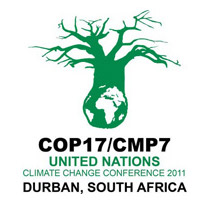
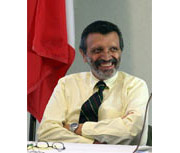 Alejandro Nadal (TEMTI Co-Chair) is one of the speakers at a nightly "teach-in" from 8 PM to 11 PM at the University of KwaZulu Natal, under the general coordination of Patrick Bond, Director, Center for Civil Society at the School of Development Studies of UKZN. The 'teach-in' runs from December 2-10 and involves speakers from many backgrounds exchanging experiences about peoples struggles to conserve their livelihoods in many countries. Nadal has been talking about the importance to redefine economic policy priorities, especially in the case of macroeconomic policies, to attain social and environmental sustainability. The emphasis has been on the importance of fiscal and monetary policies to generate the conditions for adaptation in the face of climate change. Even the Intergovernmental Panel for Climate Change (IPCC) recognizes that vulnerability is increased with poverty. Thus, macroeconomic policies that have increased inequality and poverty over the past three decades need to be radically retooled. Although mitigation and adaptation costs pose different challenges to macroeconomic policies, both fiscal and monetary policies can be realigned to improve adaptation and to strengthen the process of decarbonization of our economies.
Alejandro Nadal (TEMTI Co-Chair) is one of the speakers at a nightly "teach-in" from 8 PM to 11 PM at the University of KwaZulu Natal, under the general coordination of Patrick Bond, Director, Center for Civil Society at the School of Development Studies of UKZN. The 'teach-in' runs from December 2-10 and involves speakers from many backgrounds exchanging experiences about peoples struggles to conserve their livelihoods in many countries. Nadal has been talking about the importance to redefine economic policy priorities, especially in the case of macroeconomic policies, to attain social and environmental sustainability. The emphasis has been on the importance of fiscal and monetary policies to generate the conditions for adaptation in the face of climate change. Even the Intergovernmental Panel for Climate Change (IPCC) recognizes that vulnerability is increased with poverty. Thus, macroeconomic policies that have increased inequality and poverty over the past three decades need to be radically retooled. Although mitigation and adaptation costs pose different challenges to macroeconomic policies, both fiscal and monetary policies can be realigned to improve adaptation and to strengthen the process of decarbonization of our economies. 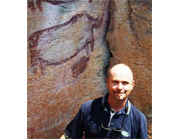
 OSISA/HBS event on climate governance in Africa. Building conflict-sensitive institutions is essential for adaptation policy that supports human wellbeing and security, Jennifer Mohamed-Katerere, co-chair of the Theme on Environment, Conflict and Security (TECS) argued at and Open Society Initiative of South Africa and Heinrich Boll Stiftung side event at COP 17.
In many developing countries, climate change is a conflict multiplier. The increased incidence of extreme events and environmental change further strain the capacity of state and community institutions to respond effectively.
OSISA/HBS event on climate governance in Africa. Building conflict-sensitive institutions is essential for adaptation policy that supports human wellbeing and security, Jennifer Mohamed-Katerere, co-chair of the Theme on Environment, Conflict and Security (TECS) argued at and Open Society Initiative of South Africa and Heinrich Boll Stiftung side event at COP 17.
In many developing countries, climate change is a conflict multiplier. The increased incidence of extreme events and environmental change further strain the capacity of state and community institutions to respond effectively. Co-Chair TEMTI - Jayati Ghosh is Professor of Economics at the Centre for Economic Studies and Planning, School of Social Sciences, Jawaharlal Nehru University, New Delhi. She was born in 1955 and educated at Delhi University, Jawaharlal Nehru University and the University of Cambridge, England where she obtained her Ph.D. in 1983. Since 2002 she has been the Executive Secretary of International Development Economics Associates (IDEAS), an international network of heterodox development economists (www.networkideas.org). She is Founding Trustee of the Economic Research Foundation (www.macroscan.org).
Co-Chair TEMTI - Jayati Ghosh is Professor of Economics at the Centre for Economic Studies and Planning, School of Social Sciences, Jawaharlal Nehru University, New Delhi. She was born in 1955 and educated at Delhi University, Jawaharlal Nehru University and the University of Cambridge, England where she obtained her Ph.D. in 1983. Since 2002 she has been the Executive Secretary of International Development Economics Associates (IDEAS), an international network of heterodox development economists (www.networkideas.org). She is Founding Trustee of the Economic Research Foundation (www.macroscan.org). CEESP Youth Engagement and Intergenerational Partnership Advisor - Catie Burlando is currently a PhD candidate at the Natural Resources Institute, University of Manitoba.
CEESP Youth Engagement and Intergenerational Partnership Advisor - Catie Burlando is currently a PhD candidate at the Natural Resources Institute, University of Manitoba. 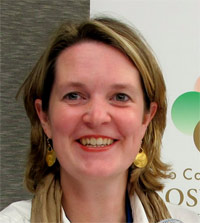 Kristen Walker Painemilla is Vice President at Conservation International and of CI's Social Policy and Practice Department (SPP). This department draws on the accomplishments and talents of the previous Indigenous and Traditional Peoples Program and performs a broad set of responsibilities, including rights-based approaches to conservation, partnerships, social responsibility, gender, engagement with development organizations and other critical social components of conservation.
Kristen Walker Painemilla is Vice President at Conservation International and of CI's Social Policy and Practice Department (SPP). This department draws on the accomplishments and talents of the previous Indigenous and Traditional Peoples Program and performs a broad set of responsibilities, including rights-based approaches to conservation, partnerships, social responsibility, gender, engagement with development organizations and other critical social components of conservation. 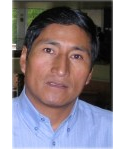 Rodrigo de la Cruz is Kichwa from Ecuador. He previously served as the Assessor for oil, biodiversity, traditional knowledge and intellectual property policies of the Coordinating Body of the Indigenous Organizations of the Amazon Basin (COICA). He is currently the Director of the Traditional Knowledge and Genetic Resources unit at the Ecuadorian Institute of Intellectual Property.
Rodrigo de la Cruz is Kichwa from Ecuador. He previously served as the Assessor for oil, biodiversity, traditional knowledge and intellectual property policies of the Coordinating Body of the Indigenous Organizations of the Amazon Basin (COICA). He is currently the Director of the Traditional Knowledge and Genetic Resources unit at the Ecuadorian Institute of Intellectual Property.
 CEESP Executive Committee Meeting - 3-day meeting of the CEESP
Executive
Committee was held in New Delhi, India 9-11 November 2011.
CEESP Executive Committee Meeting - 3-day meeting of the CEESP
Executive
Committee was held in New Delhi, India 9-11 November 2011.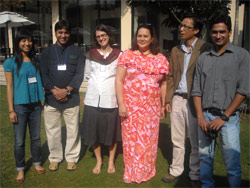 Strengthening the CEESP Youth Network. Promoting intergenerational partnerships. Strengthening regional and thematic communication and cooperation. Participating at the World Conservation Congress. These are some of the goals the CEESP Youth Leadership Team has set out to engage youth in discussions of conservation and sustainable development within and through CEESP. These goals were also presented at the CEESP Steering Committee meeting, which convened in Delhi November 9-11. As the CEESP Intergenerational Advisor, I was invited to participate in this three day meeting where participants focused on identifying CEESP's key priorities and program for 2013-2016. The IUCN program and CEESP's participation at the 2012 World Conservation Congress were also discussed. In addition to the goals of the CEESP Youth Network, I presented the results of the “Cross-Commission Survey Report: Youth Engagement and Intergenerational partnership” that the Task Force on Intergenerational Partnership for Sustainability conducted in October 2011 to provide young professional's perspectives on the IUCN program for 2013-2016.
Strengthening the CEESP Youth Network. Promoting intergenerational partnerships. Strengthening regional and thematic communication and cooperation. Participating at the World Conservation Congress. These are some of the goals the CEESP Youth Leadership Team has set out to engage youth in discussions of conservation and sustainable development within and through CEESP. These goals were also presented at the CEESP Steering Committee meeting, which convened in Delhi November 9-11. As the CEESP Intergenerational Advisor, I was invited to participate in this three day meeting where participants focused on identifying CEESP's key priorities and program for 2013-2016. The IUCN program and CEESP's participation at the 2012 World Conservation Congress were also discussed. In addition to the goals of the CEESP Youth Network, I presented the results of the “Cross-Commission Survey Report: Youth Engagement and Intergenerational partnership” that the Task Force on Intergenerational Partnership for Sustainability conducted in October 2011 to provide young professional's perspectives on the IUCN program for 2013-2016. 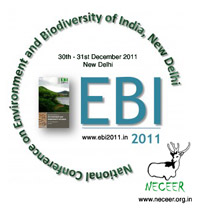 The National Conference on Environment and Biodiversity of India (EBI2011) that will be held in New Delhi on December 30 and 3, 2011, is a platform for researchers, academicians, students, conservationists, environmentalists, foresters and policy makers to share their work and to gain knowledge about the recent trends in the field of environment and biodiversity research that is occurring across India and around the world.
The National Conference on Environment and Biodiversity of India (EBI2011) that will be held in New Delhi on December 30 and 3, 2011, is a platform for researchers, academicians, students, conservationists, environmentalists, foresters and policy makers to share their work and to gain knowledge about the recent trends in the field of environment and biodiversity research that is occurring across India and around the world. 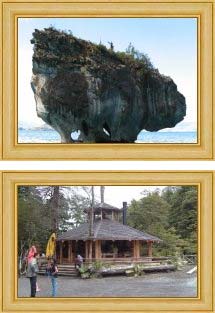 I. Sobre la génesis de las áreas silvestres protegidas
I. Sobre la génesis de las áreas silvestres protegidas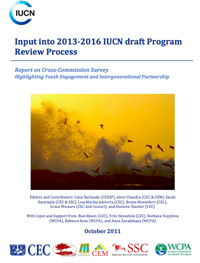 Catie Burlando
Catie Burlando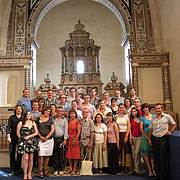 About 50 participants from all over Europe convened in the beautiful Italian town of Gerace in Calabria, close to the Southern tip of Europe, to share, illustrate and discuss experiences on community conservation in the continent, many of which can be resumed as “ICCAs”—an acronym standing for “indigenous peoples' conserved territories and community conserved areas”.
About 50 participants from all over Europe convened in the beautiful Italian town of Gerace in Calabria, close to the Southern tip of Europe, to share, illustrate and discuss experiences on community conservation in the continent, many of which can be resumed as “ICCAs”—an acronym standing for “indigenous peoples' conserved territories and community conserved areas”.  The deadline for submissions to the Independent Panel on the Niger Delta has been extended until Thursday 22 December 2011.
The deadline for submissions to the Independent Panel on the Niger Delta has been extended until Thursday 22 December 2011. 
 UNESCO release, 29 November 2011 | BALI, INDONESIA: The sixth session of the Intergovernmental Committee for the Safeguarding of Intangible Cultural Heritage was held from 22-29 November 2011, in Bali, Indonesia. During the meeting, 11 items were added to the List of Intangible Heritage in Need of Urgent Safeguarding and 19 others were inscribed on the Representative List, while five best safeguarding practices were selected.
UNESCO release, 29 November 2011 | BALI, INDONESIA: The sixth session of the Intergovernmental Committee for the Safeguarding of Intangible Cultural Heritage was held from 22-29 November 2011, in Bali, Indonesia. During the meeting, 11 items were added to the List of Intangible Heritage in Need of Urgent Safeguarding and 19 others were inscribed on the Representative List, while five best safeguarding practices were selected. 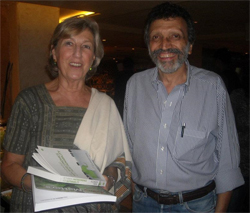 Policy Matters Issue 18 on 'Macroeconomic Policies, Livelihoods & Sustainability"
was launched at a special function with CEESP Executive Committee members, IUCN Councillors and Secretariat staff in New Delhi, India on 9 November 2011.
Policy Matters Issue 18 on 'Macroeconomic Policies, Livelihoods & Sustainability"
was launched at a special function with CEESP Executive Committee members, IUCN Councillors and Secretariat staff in New Delhi, India on 9 November 2011. 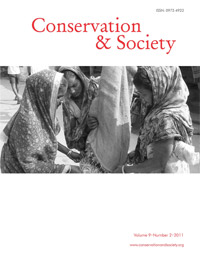 CEESP Member James Gruber has published in the open-source journal Conservation and Society. Abstract: Community-based natural resource management (CBNRM) has been recognised as an effective governance approach for sustainably managing commons or common-pool resources. Yet there is limited empirical research on answering the critical question: What are the principles and key characteristics that are needed to ensure longterm effective and sustainable CBNRM programmes?
CEESP Member James Gruber has published in the open-source journal Conservation and Society. Abstract: Community-based natural resource management (CBNRM) has been recognised as an effective governance approach for sustainably managing commons or common-pool resources. Yet there is limited empirical research on answering the critical question: What are the principles and key characteristics that are needed to ensure longterm effective and sustainable CBNRM programmes? Open and respectful dialogues between scientists and food providers are needed to transform the dominant paradigm of agricultural development.
Open and respectful dialogues between scientists and food providers are needed to transform the dominant paradigm of agricultural development. 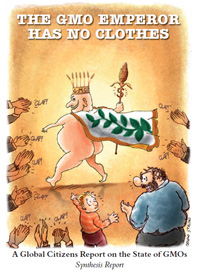 These new reports highlight scientific research and empirical experiences from around the globe demonstrating how genetically modified (GM) seeds and crops have failed to deliver its advertised promises.
These new reports highlight scientific research and empirical experiences from around the globe demonstrating how genetically modified (GM) seeds and crops have failed to deliver its advertised promises.  The Potato Park communities in Peru are deeply committed to the conservation of biocultural resources, associated knowledge, and indigenous rights, and undertook this research to further investigate the role of customary norms and institutions in the protection of traditional knowledge (TK) and resources.
The Potato Park communities in Peru are deeply committed to the conservation of biocultural resources, associated knowledge, and indigenous rights, and undertook this research to further investigate the role of customary norms and institutions in the protection of traditional knowledge (TK) and resources. 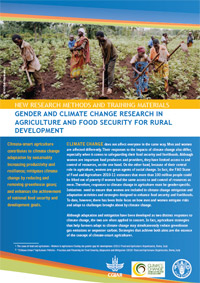 The Climate Change, Agriculture and Food Security Program (CCAFS) of the Consultative Group on International Agricultural Research (CGIAR) and the Food and Agriculture Organization of the UN (FAO) have released a joint paper titled “Gender and Climate Change Research in Agriculture and Food Security for Rural Development.
The Climate Change, Agriculture and Food Security Program (CCAFS) of the Consultative Group on International Agricultural Research (CGIAR) and the Food and Agriculture Organization of the UN (FAO) have released a joint paper titled “Gender and Climate Change Research in Agriculture and Food Security for Rural Development.
 The Green Development Initiative has published a Reference Guide for review called Conserving our planet, hectare by hectare. The Green Development Initiative (GDI) is an international response to the Convention on Biological Diversity (CBD) and the Strategic Plan for Biodiversity 2011-2020. It aims to establish an international standard and certification scheme for CBD-compliant land management.
The Green Development Initiative has published a Reference Guide for review called Conserving our planet, hectare by hectare. The Green Development Initiative (GDI) is an international response to the Convention on Biological Diversity (CBD) and the Strategic Plan for Biodiversity 2011-2020. It aims to establish an international standard and certification scheme for CBD-compliant land management. 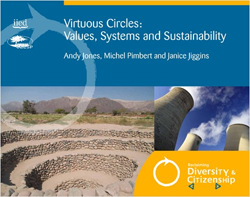 A book published today by IIED and CEESP paints a vivid picture of an alternative future in which food, energy and water supplies are sustainable and in the control of local communities.
A book published today by IIED and CEESP paints a vivid picture of an alternative future in which food, energy and water supplies are sustainable and in the control of local communities. 




